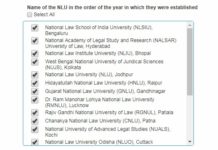[This is one of the interviews that I most keenly was looking forward to. Kanishka Mohan Singh Rathore (NALSAR Class of 2011) happened to be the proverbial ‘my fifth year’ while I entered law school and I think that sums up how I look up to him. He is currently Legal Advisor at CMS Cameron McKenna LLP, an international law firm which is also one of the top firms in the UK and having an especially strong presence in Europe. He has very kindly consented to grant us an interview on foreign jobs, vacation schemes and life in general after law school while working in a top notch foreign firm. – Sandipan De.]
Tables have turned. Now is my time to rag you by bombarding you with questions. The eternal question first. Why law?
No matter how much of Consti, Ad. Law or Corporate Law one might study; why law still remains the toughest question. After scoring an abysmal 70 in Mathematics in my Class XII board exams, a budding engineer suddenly realized that perhaps it’s much cooler to wear the Black Coat. Hence, law.
Still smoking Milds?
Haha, wish I could get the good, old Classic Milds in London. Sadly, I’m on Dunhill these days (not to mention that I’m trying to quit and the cigarette prices over here are surely helping me do that).
Could you tell us all about Vac Schemes and Training Contracts? How does it work?
To cut the long story short, a vacation scheme works like an internship with the difference being that an individual’s chances of converting a vacation scheme into a training contract are considerably higher once the vacation scheme has been obtained. Students in their penultimate year of law school are required to apply online (by completing an online application form with crappy questions like, “please describe a challenge you faced at your workplace and what steps did you take to overcome the challenge?”). All the premier law firms have their application forms and weblinks where students can access the all-at-one-stop web portal by creating an online account. After, the deadline for the applications is over, respective law firms release a shortlist of candidates who have made it to the personal interviews (these days personal interviews also contain some short written tests). UK Law firms generally fly down to India to conduct interviews and select a handful of students for either a Vacation Scheme or a Training Contract. Although, a vacation scheme guarantees an all expenses paid trip to London, Singapore etc., however the recent trend suggests that it’s becoming increasingly harder to convert a VS into a TC. It is therefore best if a student can manage to get a training contract directly (however, lot of UK firms prefer to give VS first and then make an offer for a TC). A training contract guarantees an individual a job as a Trainee Solicitor in the UK for two years post which the Law Firm takes a call to retain a trainee or not based on his/ her performance.
How was the interview like for CMS?
Wow, seems a long time back when I gave it. After clearing the online application process and a written test, I was shortlisted for an interview by CMS Cameron Mckenna LLP along with eight other people in NALSAR. The interview was conducted by Simon Pilcher, Pensions Partner at CMS. Simon has been recruiting individuals for CMS for the past 18 years and this was something he told me right at the start of the interview lest I was in an attempt to bluff my way through. The interview was a medium to test my response to a lot of crisis situations (put in the form of mock questions). To give an example, one of the questions I was asked was, “Suppose you are the junior most employee of the firm working on a crunch deal and after days of hard work your team submits a report to the clients. One fine day when you’re working late at night with hardly anyone in office, you get a phone call from the client who is furious over one of the suggestions recommended in the report; he needs answers and that too quickly, what do you tell him?”.
There were various questions similar to this and then a few general questions like “do you think that India should be hosting the Commonwealth Games when there are more pressing issues like poverty, inadequate healthcare at hand?” The interview went on for 1 hour and 15 mins after which I ran to Shankar’s to de-stress.
In your opinion what or rather who are they looking for?
Good question. I personally feel that UK Law Firms’ approach towards hiring students from India has undergone a dramatic change in the last couple of years following the economic crisis. While adaptability to an international work environment and surroundings is a major factor which still remains a key issue for them, a lot of the majors are now becoming more CGPA oriented. Considering that the UK hiring of Indian students has taken a serious hit in the last couple of years, most of the law firms now want to play safe and give CGPA a very high importance.
Is there any set formula to land there?
I personally believe that there is no set formula to land here. Just enjoy law school, work when you’re required to and chill when you’re not. Build small goals and work your way up. Most importantly, be confident and speak freely on the day of the interview.
Old Monk or Scotch?
I would not want to be judged by this answer but I was hoping that there was one more option in the form of “Single Malts”.
How is it to live in London all by yourself and work in a foreign firm being an Indian and having graduated from an Indian law school?
To be brutally honest with you, life’s not all that rosy here as one imagines sitting in India. However, it’s an experience of a lifetime. There is more to this place than just work. It’s not just about growing as a professional but also growing as an individual here. You do everything from finding a house, to paying your council tax, electricity, gas bills (trust me, doing all this in a new country is crazy). You work in a very different environment and party with people with heavy Scottish accent, it’s very different, it’s very unique.
Difference in the work environment.
There is a huge difference in the work environment at CMS as compared to the Indian Law firms where I have previously worked or interned. The employee satisfaction is immensely high and people are a happier lot. Weekends are sacrosanct and there are a lot of firm activities and drinks every other day. Every effort is made to make you feel comfortable and keep stress levels at the minimum. Your seniors are more of mentors rather than being mean bosses. Apart from the conventional work on deals, there are regular training sessions to brush your knowledge and most importantly if you’re a cricket fanatic like me, “you get to play at Lord’s for the firm”.
Word of advice to law school aspirants and the ones who have appeared for CLAT 2012.
Breathe. It cannot end when it hasn’t even begun. All the best.
















Kanishka bhaiya, would love to know what was your reply to that question asked while interviewing you,.. life as d junior most employer.
The last line.
Hi Shirini, interviewers often put questions like this to gauge a certain professional trait in you. If you observe the question carefully, itclearly mentions the fact that you were working in a “team”. An organization can only profit if it employs people who are good team players. My answer basically was that since the report was submitted my the team as a whole and was a joint effort, it would be really unfair and juvenile on my part to try to tackle the situation on my own. However, understanding the gravity of the situation i would tell the client that one, i totally understood his problem (to cajole him a bit) and two, that it would be in the best interest of all if i was given sometime to discuss the matter with my team and revert at the earliest. Post which i would email my team about the problem at hand and fix a early morning meeting.Hope that answers your query.
How the hell can anything be very unique?